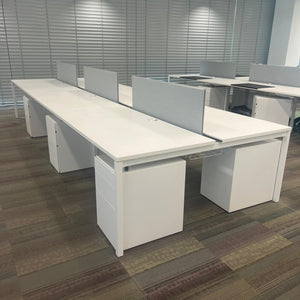A bench desk, also known as a benching system or shared workbench, is a type of office furniture that combines multiple individual workstations into one long, continuous surface or "bench." It is designed to maximize the use of space in an office, while providing a collaborative environment for employees.

Bench desks typically have little or no partitions between workstations, which encourages interaction and communication among team members. These desks often have integrated cable management systems and are available in various sizes and configurations to accommodate different office layouts and needs.
Bench desks have gained popularity in recent years, as they are well-suited for open-plan office spaces and agile working environments. They offer several advantages over traditional cubicles and private offices, as well as some potential drawbacks.

Advantages of bench desks:
-
Space efficiency: Bench desks make better use of available floor space than individual desks, as they eliminate the need for aisles and partitions. This allows companies to accommodate more employees within a given area, reducing overall real estate costs.
-
Collaboration and communication: The open layout of bench desks fosters a more collaborative work environment. Employees can easily interact and exchange ideas, which can lead to increased creativity, innovation, and productivity.
-
Flexibility and adaptability: Bench desks can be easily reconfigured to accommodate changing team sizes, project requirements, or office layouts. Modular designs allow for the addition or removal of workstations as needed.
-
Cost-effective: Due to their shared components and simplified design, bench desks are often less expensive than traditional office furniture. This can result in significant cost savings, particularly for large-scale installations.
-
Integrated technology: Many bench desks include built-in cable management systems, power outlets, and data ports, which helps keep workspaces organized and clutter-free.

Potential drawbacks of bench desks:
-
Lack of privacy: The open design of bench desks may not be suitable for employees who require privacy to concentrate or handle sensitive information.
-
Noise and distractions: Without partitions, bench desks can lead to increased noise levels and visual distractions, which may negatively impact productivity for some individuals.
-
Ergonomics and personalization: Bench desks may not offer the same level of adjustability and customization as individual workstations, potentially leading to ergonomic challenges for some users.
-
Limited storage: Due to their minimalist design, bench desks often provide limited storage options, which can result in cluttered workspaces if not properly addressed.
Despite these potential drawbacks, bench desks continue to gain popularity as organizations increasingly prioritize collaboration and efficient use of space. Companies can mitigate some of the downsides by providing designated quiet areas, implementing acoustic solutions, and offering adjustable seating and work surfaces to accommodate individual preferences.





















































